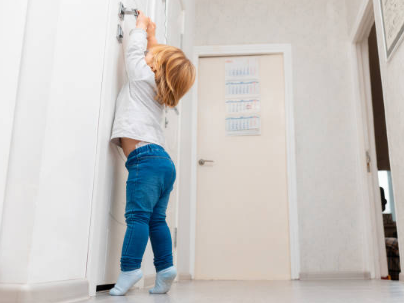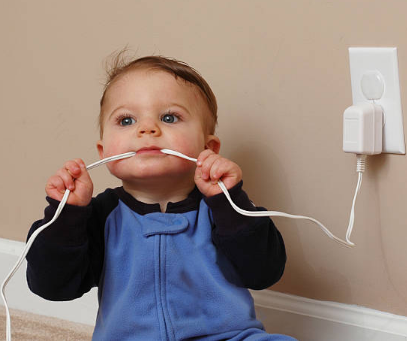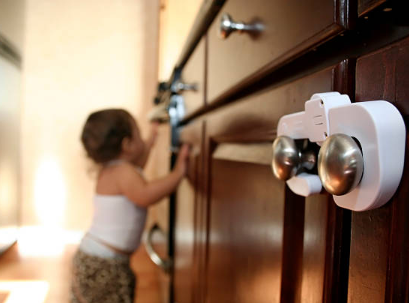When you’re holding your petite and fragile newborn in your arms, it’s hard to imagine that soon one day they’ll pull up the furniture and explore the cupboards… And maybe climb the bookshelf! Soon, the baby, once content to stare around the room and fixed in one place, will stagger towards and overthrow all those forbidden fragile family heirlooms.

So it’s time to embrace the fact that child protection will now be one of your most important daily tasks. Here’s a guide on how and when to make your home safer, appropriate for your child’s age and stage of development.
Infant Protection for Newborns
Of course, newborns can move just like potted plants, but there are some life-saving measures you need to take to make sure your home is safe for your baby.
- Install smoke and carbon monoxide detectors on every floor of your home.
- Place a fire extinguisher in an easily accessible location on each floor (always one in the kitchen). If you live in a high-rise building, plan your escape plan (ask your doctor if you should use rope ladders and smoke hoods). (Learn more about fire safety tips.)
- Use tip-proof furniture straps to secure the TV and furniture to the wall. You can get them online or hire a professional child protector to install them for you. (These make the house earthquake-proof and prevent small children from tipping over or crushing the house when they climb or jerk.)
- All wires are at least three feet from the crib… They are in danger of being strangled.
- Lower the water heater thermostat so that the temperature does not exceed 120 degrees Fahrenheit. This will prevent accidental burns while bathing. (Run the hot water until it gets hot, then, fill a cup and check with a meat thermometer.)
- Install doors around the pool or hot tub to protect your baby… and children visiting.
- No blankets, pillows, bumpers, or large toys in the crib for the first 12 months.
- And, while you do, it’s a great idea to take a baby CPR class!

Protect Babies Who Are About to Crawl
Now the fun begins… At least for the baby. Once your baby starts moving, you have to be vigilant.
- Use a baby gate to block off restricted areas. It is especially important to place one at the top of stairs, around pet food, or cat litter. And if you have a working fireplace, place a door around it.
- Install latches on cabinets that you don’t want your baby to enter, especially those that contain toxic cleaning supplies, medicines, or small objects that may pose a choking hazard. (If there is space, some parents like to leave a cabinet unlocked and let the baby enjoy exploring safe objects such as plastic containers).
- Put a latch on the toilet seat! (Babies drowned in their own bathrooms.)
- Don’t put buckets around. (They were also overwhelmed by these.)
- Get on all fours like your baby! Inspect the entire floor – from wall to wall – for loose bodies that may be causing suffocation. A good rule of thumb is: if it fits in a toilet paper tube, it’s small enough to be swallowed, just like coins, marbles, coin cells, magnets, staples, plastic scraps, paper clips, thumbtacks, and chunks. Children’s toys (think: Lego bricks or Barbie shoes).
- Check your doorstop for a removable lid (choking hazard!). If so, replace it with a one-piece, child-safe version.
- Never handle hot food/liquids while your baby is in your arms. A sudden slam can cause severe burns.
- Cover the sharp furniture corners with protective bumpers. They come in a variety of colors, sizes, and materials, so you can pick and choose the one that best suits your space. (If you need to cover them immediately, or while traveling, you can temporarily reduce the risk by covering them with cotton balls and several coats of paint tape.)
- Little reptiles do dangerous things like stick their tongues in an electrical outlet or pull out the plug (halfway) and touch them! Cover all power outlets within reach or change to a child-safe version. Hide the power strip behind furniture.
- Hide the wires so your crawler can’t pull down any lights, computers, TVs, irons, or other appliances or wrap the wires around your neck!
- Remove all the chemicals under the sink (especially bleach, drain cleaner, ammonia, and dishwashing detergent…) And stop using the dishwasher detergent box altogether, they can be very dangerous if the child takes them out of the dishwasher and swallows them.
- Cover any hard surfaces where your baby may fall and hit their head (such as a brick fireplace).

Baby-Proof Your Baby Who Is About to Learn to Walk
Watch out, world! Your child is now upright and their world is a bigger place… It’s also more dangerous! Keep your toddler safe with these important extra steps.
- Lock windows or install window guards to prevent your child from falling.
- Keep your little one out of the kitchen!
- Install the oven lock and knob lid on the stove.
- Put away sharp objects. This means storing your knives in temporary storage and keeping your cutlery in a locked drawer.
- Keep alcoholic beverages in tall cabinets or locked cabinets. The same goes for CBD products.
- Keep the firearm unloaded and locked.
- If you haven’t already done so, lock the toilet seat in the closed position. (Just make sure the big kids… And adults… Know how to unlock them! )
- Install doors around the pool or hot tub to protect your kids… as well as visiting children.
- Adjust the crib mattress to the lowest level. Spread a thick carpet on the floor around the bed and have no hard objects to protect your child from falling during the “prison break”.
Child Protection for Your Toddler/Little One
Super maneuverability means that new dangers need to be taken into account. When your child is old enough to understand, it’s important to explain to you why certain items are prohibited, such as hot stoves and cleaning products. Here are some other things to look out for:
- Keep matches and lighters out of reach.
- Store small kitchen utensils out of the reach of children. For example, never plug a blender where a child can turn it on.
- Continue to lock up drugs, alcohol, and toxic products (sewer cleaners, pesticides).
- Never leave a birthday balloon in the bedroom – a popping balloon can pose a serious choking hazard.
- According to the Poison Control Center, hide the piggy bank until you are around 4 years old – coins are the most commonly swallowed foreign body.
- Lock the door to the outside to prevent unauthorized wandering. If your child is becoming a bit like a locksmith, add a latch to the top of the door so that your child can’t reach it.
- Disable bathroom door locks… Or make sure you have a way to get in, if your kids are stuck there… That’s what happens!
